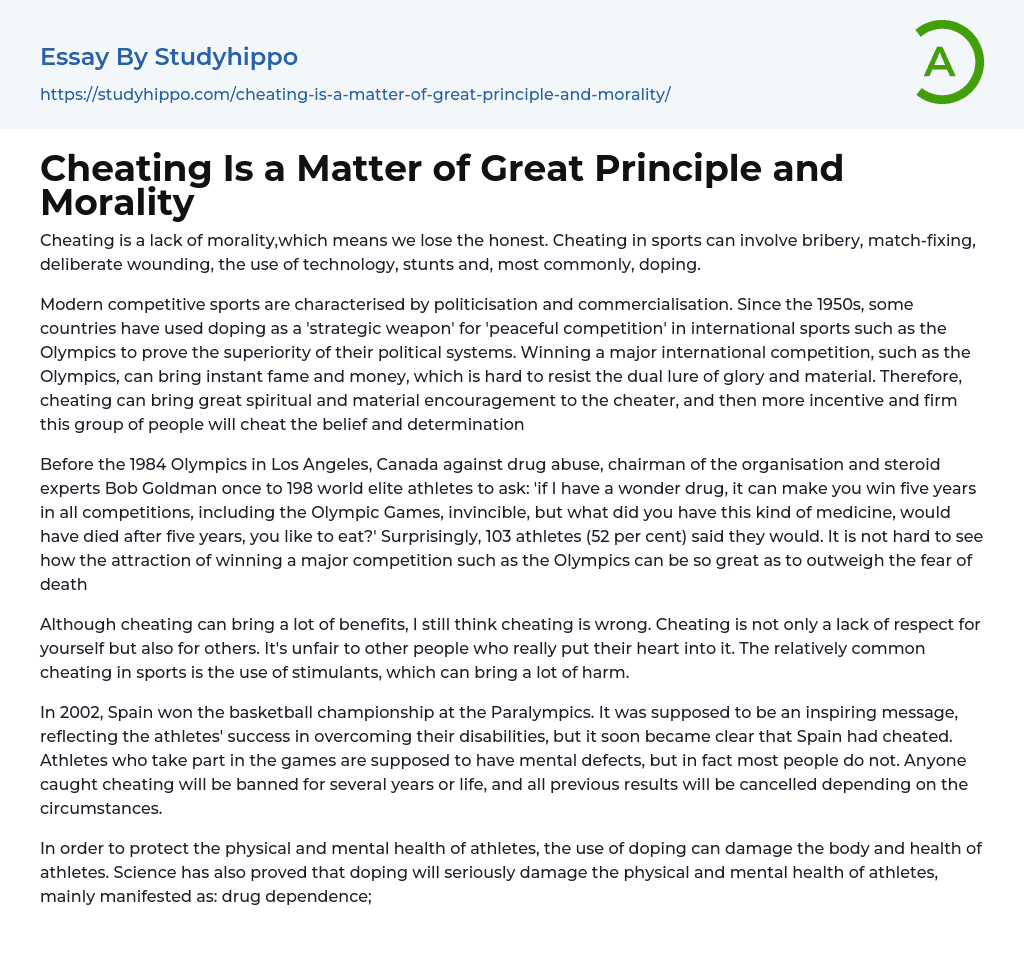

Cheating Is a Matter of Great Principle and Morality Essay Example
Cheating is the absence of ethical principles, resulting in the loss of integrity. In the realm of sports, cheating can encompass various acts such as bribery, match-fixing, intentional harm, the application of technology, stunts, and most frequently, doping. The contemporary landscape of competitive sports is marked by its politicization and commercialization. Starting from the 1950s, certain nations have employed doping as a "strategic weapon" in "friendly competition" within global sports events, like the Olympics, to demonstrate the dominance of their political structures.
Winning a major international competition, such as the Olympics, is irresistible due to the instant fame and money it brings. Cheating in such events can provide both spiritual and material encouragement to the cheaters, thus strengthening their belief and determination to cheat. Prior to the 1984 Olympics in
...Los Angeles, Bob Goldman, the chairman of Canada against drug abuse, and a steroid expert, questioned 198 elite athletes about a hypothetical wonder drug. He asked if they would be willing to take a drug that would guarantee victory for five years in all competitions, including the Olympic Games, but would result in death after five years. Surprisingly, 103 athletes (52%) expressed their willingness to take such a drug. This clearly demonstrates how the allure of winning in major competitions like the Olympics can overshadow the fear of death. While cheating may offer numerous benefits, I believe it is morally wrong. Cheating not only shows a lack of respect for oneself but also for others who genuinely dedicate themselves to the competition.
The use of stimulants in sports, a common form of cheating, can result in considerable harm. In 2002, Spain's win in the basketball championship
at the Paralympics was meant to be an inspiring demonstration of the athletes' ability to overcome their disabilities. However, it was soon revealed that Spain had employed deceitful tactics. As per the regulations, players in the games were supposed to have mental impairments; however, this requirement was not met by most participants.
Cheaters who participate in doping will face severe consequences, such as being banned for extended periods or even for life. In certain cases, their previous achievements may also be nullified. Scientific research has demonstrated that the utilization of doping can have negative effects on athletes' physical and mental well-being. These effects encompass drug addiction, substantial changes in personality, disruption of cellular and organ functions, weakened immune systems, allergic reactions, and various emotional impacts.
The principles of scientific training within competitive sports prioritize the preservation of fair play and the maintenance of a level playing field. Nonetheless, the misuse of stimulants undermines these principles as it causes athletes to overlook studying and comprehending training regulations. This deviation from proper training methods can lead athletes to believe that using drugs is the sole scientifically valid approach to training. Such a belief fundamentally disrespects sports science and is regarded as pseudoscience.
Cheating in sports not only defies the spirit of fair play but also significantly impedes the healthy and sustainable development of sports. It constitutes an act of deceit that violates sports ethics while subverting the principle of equitable justice. The use of performance-enhancing drugs conceals athletes' true abilities and generates an unjust competition environment that contradicts the fundamental purpose of sports.To summarize, cheating in sports not only violates moral standards but also brings disgrace to nations by damaging
their international reputation. It is crucial to recognize that despite its prevalence, cheating should never be justified or excused. Individuals who cheat will inevitably feel guilty and suffer psychological distress.



